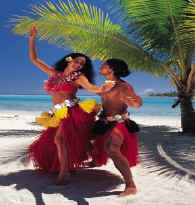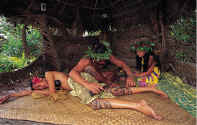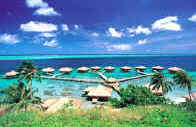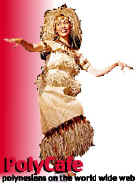





![]() Culture
Culture![]()
The
missionaries did all they could to wipe out traditional Polynesian
culture by levelling  temples,
destroying carvings, and banning tattoos and that heady, erotic
dancing that teachings of the Good Book and their own autocratic
commandments, but fortunately some of the traditional ways survived.
Recently there's been a strong push to revive old ways and rediscover
traditional arts. Traditional musical instruments include pahu
and toere drums and the curious nose flute called a vivo.
Guitars and ukuleles made their way into Polynesia and the locals
developed a unique song style that owes much to country & western
music in form but has a distinctive South Pacific island groove.
Customary dancing (tamure) has slowly made its way back into
French Polynesian life, but, sadly, the art of making tapa (bark
paper and cloth), practised throughout the Pacific, has all but
disappeared.
temples,
destroying carvings, and banning tattoos and that heady, erotic
dancing that teachings of the Good Book and their own autocratic
commandments, but fortunately some of the traditional ways survived.
Recently there's been a strong push to revive old ways and rediscover
traditional arts. Traditional musical instruments include pahu
and toere drums and the curious nose flute called a vivo.
Guitars and ukuleles made their way into Polynesia and the locals
developed a unique song style that owes much to country & western
music in form but has a distinctive South Pacific island groove.
Customary dancing (tamure) has slowly made its way back into
French Polynesian life, but, sadly, the art of making tapa (bark
paper and cloth), practised throughout the Pacific, has all but
disappeared.
Things
are pretty laid back in French Polynesia - dress standards are relaxed
even in the  classiest
restaurants and beach wear is often just from the waist down. Church
is deadly serious though and Sunday is the day of worship (fully
clothed). The Polynesian concept of family is a much broader one than
in the West - cousins, uncles, aunts etc are all part of the scene and
are called fetii. The family might also have adopted children, faaamu,
and children are commonly entrusted to relatives or childless women.
classiest
restaurants and beach wear is often just from the waist down. Church
is deadly serious though and Sunday is the day of worship (fully
clothed). The Polynesian concept of family is a much broader one than
in the West - cousins, uncles, aunts etc are all part of the scene and
are called fetii. The family might also have adopted children, faaamu,
and children are commonly entrusted to relatives or childless women.
French
Polynesia has a unique culinary tradition, with old South Pacific
cooking methods  combining
with French gastronomy and Italian and Chinese influences. This
manifests itself not just in the flashy restaurants but also in the
cheap roadside mobile snack bars, les roulottes. Food is still
cooked in traditional pit ovens that are common throughout the Pacific.
A hole is dug in the ground, stones are placed within it and then a
fire is lit to heat the stones. The food, wrapped in banana leaves, is
placed on top, and then the hole is filled in again with earth. The
baking process takes several hours. In French Polynesia this kind of
oven is called an ahimaa and the feast is called a tamaaraa.
combining
with French gastronomy and Italian and Chinese influences. This
manifests itself not just in the flashy restaurants but also in the
cheap roadside mobile snack bars, les roulottes. Food is still
cooked in traditional pit ovens that are common throughout the Pacific.
A hole is dug in the ground, stones are placed within it and then a
fire is lit to heat the stones. The food, wrapped in banana leaves, is
placed on top, and then the hole is filled in again with earth. The
baking process takes several hours. In French Polynesia this kind of
oven is called an ahimaa and the feast is called a tamaaraa.

![]()